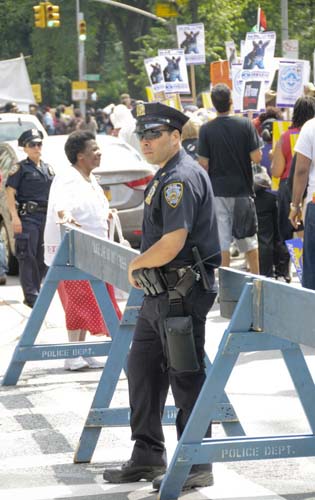Police encounters are becoming quite common these days and officers are stopping people on the streets more frequently now than in prior years.
Consequently, it is important to know your rights and how to protect yourself against improper police conduct, especially when it comes to stop and frisk laws.
What is a Stop and Frisk?
A stop and frisk is a police procedure in which an officer literally stops you on the street and pats you down. The United States Supreme Court legalized these procedures in the famous Terry case. However, the Justices limited how they could be performed and what they could involve.
In order for an officer to conduct a stop and frisk, he must first have reasonable suspicion that crime is afoot before he can make an investigatory stop.
Likewise, the police must also have reasonable suspicion that you could be carrying a weapon that might be used to harm the officer or others before he can frisk you.
New York’s Controversial Policy

Although the framework mentioned above is how a stop and frisk is supposed to occur, many have not happened like this. In New York City, a class action lawsuit has been filed on behalf of hundreds of individuals who have been frisked and subsequently let go since they did not commit a crime.
Most of these people were innocently minding their own business when they suddenly were accosted by police. At no point were they carrying a weapon and crime certainly did not look like it was happening.
Nevertheless, New York City police still stopped these people in record numbers and subjected them to frisks. The federal court judge who allowed the class action lawsuit to proceed explained that the NYDP displays what she called “deeply troubling apathy towards New Yorkers’ most fundamental constitutional rights.”
Many criminal defense attorneys and academics are beginning to question the use of stop and frisks throughout the nation. Although they began as a tool to help fight crime, some are saying the technique is becoming a tool of abuse. They argue that the tool, when used properly, is exceptionally crucial to law enforcement.
Nevertheless, deferring to police when it comes to vague things like when crime is reasonably considered to be afoot or how reasonable an officer’s suspicion truly is opens the floodgates to tremendous abuses of power.
What You Need to Know
If you are ever the subject of a police encounter that involves a stop and frisk, there are a couple things you ought to know.
First, you must cooperate.
Remember, your actions could trigger further negative consequences that you do not want. For instance, if you run away or flee, you will be considered a fleeing suspect and officers will have greater latitude to search your possessions and arrest you.
Second, take legal action after the fact.
Although you do need to cooperate at first, you ought to take legal action once the encounter is over. If you never had a weapon in your possession and the officer frisked you anyway or the surrounding circumstances could not possibly have led to a reasonable person thinking that crime was happening, make sure to contact an experienced criminal lawyer.



